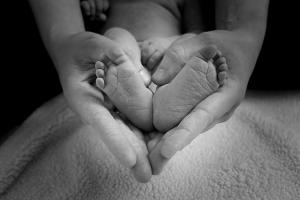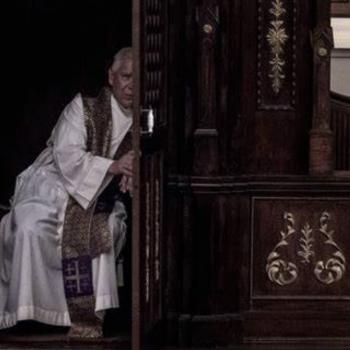In anticipation of the 50th anniversary of Humanae Vitae this summer, Sick Pilgrim will be featuring a series of essays on Natural Family Planning, the only acceptable method of achieving or avoiding pregnancy according to the teaching of the Catholic Church. These essays will not present ideological stances or theological arguments, but will simply offer unvarnished testimony from individuals who have used NFP. The struggles and sufferings that NFP carries with it frequently go undiscussed, and we wanted to offer a space for honest conversation. The essays are being posted anonymously to protect the privacy of the writers, who otherwise might not feel comfortable telling their stories. When it comes to NFP, “all things conspire to keep silent…half out of shame perhaps, half as unutterable hope” (Rainer Maria Rilke). We want NFP to work, and when it doesn’t, we keep silent and believe our struggles are unique. It is the hope of the editors of Sick Pilgrim that these essays will be a source of hope to those who struggle with NFP, and will convey the message: You are not alone.
***
I have a love/hate relationship with Natural Family Planning (NFP). I love NFP because it helped me to discover my body isn’t really compatible with the various methods available and I now have five of the most wonderful people I’ve ever met, one saint, and one more on the way. I also hate NFP because my body isn’t really compatible with the various methods available, so seven pregnancies in under 11 years have virtually torn my body in two.
I didn’t know that I had Polycystic Ovarian Syndrome (PCOS), with a splash of insulin resistance for good measure, until after I was married. My eighth grade sex ed class did a fantastic job of scaring me out of sexual activity until marriage, but I still had to deal with gynecologists not believing me, needless pregnancy tests, and the constant pressure to regulate cycles with the hormonal birth control. My Couple to Couple League Symptothermal (STM) Method instructors helped me to figure out PCOS might be a factor, but I had “uncooperative mucus” and a high cervix, so even the classes we took before the wedding weren’t entirely useful.
Right before our fourth anniversary, we lost our first child to an early miscarriage. My STM OBGYN was as devastated as we were, but when we conceived the very next cycle, he did all that he could to help my body carry to term, including those wonderful progesterone shots in the posterior.
Something changed with those first two pregnancies. My body seemed to jump into hyper-fertility. After nearly five years of “my body is a barren wasteland” jokes–made in response to constant prodding for us to start a family–and we suddenly had whiplash from cracks like, “What are you, rabbits?”
Our third child wasn’t the sleeper that the first two were. He nursed for longer on top of it, and I was just exhausted. I carry all my pregnancy weight in the midsection, and four pregnancies in four and a half years left me with SI joint pain, Diastasis Recti (DR), and an umbilical hernia that went undiagnosed. I really needed time to heal mentally and physically, so I found an instructor to help me learn something called the Boston Cross-check monitor protocol. I had high hopes, but the monitor only helped a few cycles before it stopped detecting the hormonal shifts, and before I could adjust to the protocol, I was pregnant again.
It was a difficult pregnancy for me mentally. I cried daily through most of the first trimester. I was swinging between being scared of losing the baby and scared to have the baby. My first delivery had resulted in 27 hours of labor and an emergency c-section. My next two children were born in a state that was not VBAC friendly, so I was looking at a fourth (and scary) c-section with my third OBGYN. The umbilical hernia limited my ability to care for my children. I had a lift limit. We didn’t live near family and I didn’t have much help doing the day. With the help of my husband and my OB, my fears gave way to the joy.
Nursing and nighttime were easier this go-around. I was well-rested, and felt more myself. I waited until I could wean and had the hernia surgery I needed. I learned more about the Boston Cross-check protocol and how it could work for me. I was pregnant the cycle after the hernia repair. I was happy, and nervous. Then my husband was transferred out of state.
I had to find an OB willing to deliver a 5th c-section pregnancy and take me as a transfer in the last trimester. It was my first time with an OBGYN that was unfamiliar with any NFP method. If I wanted that, it meant a two hour drive. Somewhere in the beginning of the second trimester, I had multiple hernias develop around the previous hernia that had been surgically repaired with mesh. We were happy, but life deals us stress. The birth of our fifth child on earth was seamless. There were no complications with the c-section, and recovery was pretty normal.
It was clear to me that I was no longer living somewhere where I felt I was supported by my physician. I waited until my youngest had weaned and scheduled my second hernia repair. My general surgeon was very unhappy about my inability to say I was not going to have more children. My OBGYN was not pleased with my inability to say I was not going to have more children. I wanted to be Catholic and make my NFP method combo work for us. I wanted to be done with pregnancy for my own health.
We’re expecting our sixth child in May.
I could give you every detail of my life to help convince myself that I did all that I could. The truth is that I wish I had known more about my body, more about NFP methods, and more about what pregnancy does to your body sooner. I can’t change any of those things. I am in my mid-thirties and faced with the hard, cold, facts: my body might not make it through this pregnancy. I have spent the better part of a decade pregnant or nursing. I hurt more than I ever have. I know I have another hernia. I see a chiropractor to keep the SI joint in place but we both have come to the conclusion that it will not stabilize until I am able to correct the DR, either with rigid, specific exercise or surgically, or both. A uterus can only take so many c-sections. My risk increases with age but I have many fertile years ahead of me and NFP isn’t the solution I need it to be.
So what does a faithfully Catholic woman do? Right now, I obsess. I convince myself that my not Catholic husband and I can live the next 15+ years with little to no sexual relationship. I convince myself I can trust that my body will not suddenly develop multiple ovulation cycles or that I have not been missing this already with the monitor. Then I panic, and decide that the logical solution here is sterilization because hormonal birth control really isn’t a solution that would be good for me. Then I cry myself to sleep knowing I wouldn’t be able to confess this and that I would be separating myself from the sacraments just as my children are reaching the the age for sacraments, and then I cry not knowing how it would effect my PCOS treatment. Then I feel a hint of relief thinking my not Catholic husband could take on the sterilization, which is immediately followed by waves of Catholic guilt. Then there is a part of me that is almost, definitely but quietly, praying for a complication that takes away my choice in the matter. I try to shut all of it off.
Tomorrow, I am traveling two hours to specialists because there might be a problem with the placenta. It may have grown into the uterine wall, meaning I would have to deliver very early, two hours from home, and lose my uterus in the process. I’m 25 weeks into this pregnancy and I just feel numb.
Does being Catholic mean faithful women are better off praying for a hysterectomy to end the struggle with NFP? What do we do when there is a moral rationale for an ectopic pregnancy, but we can’t apply the same rationale to sterilization for the health of the mother? Or can we? What options are available for women when NFP methods are not made for them but pregnancy risks their health or their lives?
The anonymous posts in Sick Pilgrim’s You Are Not Alone series have been curated by editor Maren Grossman.













